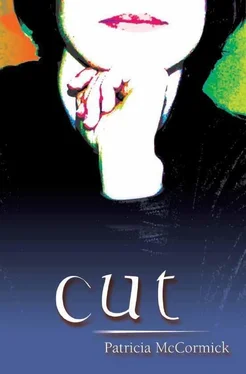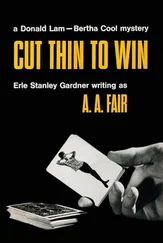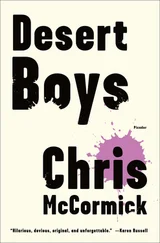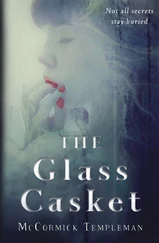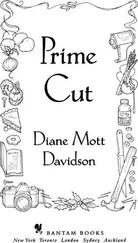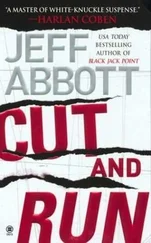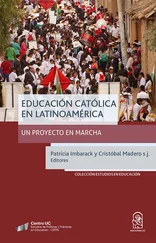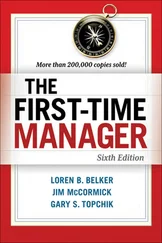“Mommy,” said Sam, “can I get some candy?” He was pointing to the vending machine.
My mom said yes and I thought about how Sam could just walk over and buy himself a Snickers, without an escort. My mom gave him a bunch of quarters, and he skipped, actually skipped, over to the vending machine.
“Daddy’s putting in some extra hours,” my mom whispered when Sam was out of earshot. “He’s trying to make a little extra money.”
She folded her tissue into a neat square, then a smaller one, then an even smaller one. Keeping track made me dizzy.
“We got a letter from the insurance company.” She was speaking so quietly, I had to lean in to hear her. “They won’t pay for your… your treatment here.”
The reception room lifted off the foundation, floated for a second, then became solid again. I checked to see if my mom noticed.
“They say they won’t pay because this thing you do, you know, cutting yourself, they say it’s self-inflicted. They don’t cover things that are self-inflicted.”
The room hovered in the air again, then the floor slid away and I was on the ceiling looking down at a play. The character who was the mom was still talking; the one who was me was fiddling with a piece of thread from the couch. Offstage, a Snickers bar clattered down the insides of a vending machine. I tried to concentrate on what the mother was saying. Something about seeing friends at the mall. “I told them you were under the weather,” she said. The tissue, now a tiny, tiny square, wobbled in and out of focus. “Are you keeping up with your schoolwork?”
The mother’s mouth was moving, but the character who was me was walking away, through the maze of sofas and coffee tables and more sofas until finally I was in the visitors’ restroom, rubbing my wrist along the teeth of the paper towel dispenser. It was like my whole body was just this one spot on my arm that was begging to be scratched, carved, cut—anything, anything—for relief. There was a jab, bright beads of blood, and finally I was OK. I pulled my shirtsleeve down, pressed my cheek against the cool tile wall for a minute, then walked back into the reception room like everything was fine.
Except that the reception room was practically empty. I’d been in the restroom only a minute, I thought, but my mom and Sam and just about everybody else were gone. I made my way through the grid of sofas and coffee tables, forcing myself to concentrate, to slow down, so I didn’t break into a run.
I finally found Sam down the hall, sitting by himself in the game room, this dark little library-type place where they keep board games and cards that nobody ever plays. The game room is my favorite place here; I go there just about every night during free time to get away from the fake laughter from the TV in the dayroom, and the fake applause from the TV at the attendants’ desk, and all the radios and the blow dryers in the dorm. When I came in, Sam turned around and grinned, showing off his big, new rabbity front teeth.
“Cal! Look what game they have,” he said. “Connect Four.”
Connect Four, a kind of tic-tac-toe where you have to get four checkers in a row in a plastic stand, is our favorite game to play together. We started playing it when Sam first got sick and he wasn’t allowed to run around anymore. In the beginning I let him win, because he was younger and because he was sick. Now he beats me every time.
I don’t know how he does it, but Sam has this way of seeing two or three ways to win. Meanwhile, I use up all my moves trying to block him—or trying to get four in a row in a straight, up-and-down line—until Sam yells “Gotcha,” and points to some diagonal row I completely overlooked.
“Wanna play?” he said.
I checked to make sure no one was around. Sure, I wanted to say. Sure. I willed my myself to speak, but nothing happened. I sent commands from my brain to my mouth. Nothing. I wondered if a person’s voice muscles can forget how to work if they’re not used for a long time.
I stared out the window for a while, like the answer might be out there. I nodded.
Sam took the black checkers, I took the red. That’s the way it always is. We don’t even have to discuss it. The only sound, as we sat at the card table playing, was the click of checkers dropping into their slots. I imagined myself saying chatty, big-sister things—about Linus, about Sam’s hockey card collection—but just thinking about talking was exhausting.
Sam plunked a checker into the plastic stand; he pointed to a row of four blacks that seemed to appear out of nowhere.
“Gotcha,” he said. “Wanna play again?” He didn’t wait. “OK,” he answered himself.
It dawned on me then that Sam understood. Somehow, he knew—in his weird, wise, eight-year-old way—that I wasn’t talking. So he talked for both of us. I answered by putting a red checker in the center slot. It was my favorite opening move.
“Cal,” he said, shaking his head, an old, tired Sam who pretended to be disappointed in me. “You need to think laterally.”
I watched while he put a black checker in the last row.
“That means seeing things a couple of different ways,” he said. “Mr. Weiss says I’m good at that.”
I put another red checker above the first one and wondered who Mr. Weiss was.
“He’s my tutor.” Another black checker went in, blocking my row. “He comes to the house.”
That meant Sam was too sick to go to school again. Which meant my mom must be more upset than ever. Which meant my dad would be spending more time than ever at work—or more time out with customers, or people he hoped would be customers but somehow never turned into customers.
“Don’t worry,” said Sam. “We don’t have to pay for it. School pays for it.”
I had no idea where to put another checker, so I tried to start another row from the bottom.
“Gotcha!” Sam pointed to a diagonal row of black checkers. “Lateral thinking, Cal.”
He set up the game so we could play again.
“Mom went to talk to one of your, you know, your teachers.” Something about the way he said that, something about how it was such a little-kid thing to say, made me feel bad.
He put a black checker in the last row. “She went to find her when you were in the bathroom.”
I put a red checker in the center slot again. I didn’t have the energy for lateral thinking.
Sam held his checker in the air, poised to move. “When are you coming home, Cal? No one will tell me anything.”
We sat there a while, I couldn’t tell how long. Sam’s face went from hopeful, to serious, to worried, to something I couldn’t quite read.
“It’s OK,” he said finally. “It’s just that Linus misses you.”
I look up and take in the sight of you, still sitting there, your ankles crossed, your notebook in your lap. I hate that notebook because I know some random thing—like your chair reminding me of a dead cow—could end up in there, proof that I’m crazy. But what I really hate is how every day when I come in, you turn to a fresh page and write in the date, and how every day when I leave and you walk me to the door, I can see that the whole page is empty.
You cap your pen and stand up. It must be time to go.
The cafeteria here has a humid, steamed-vegetable smell that’s enough to give anyone food issues. What’s worse than the smell, though, is the noise. Sometimes, like when I’m in Study Hall or the game room, I can pretend that this place is a boarding school, but when all the guests from all the other groups are together in the cafeteria shouting and laughing and arguing and eating, you know you’re in a loony bin.
Our group has to sit together at meals. Sydney sets her tray down in the empty space next to me.
Читать дальше
